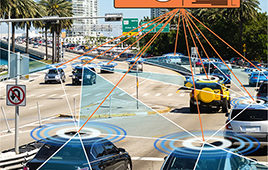Lost in Space
A review of Lab Automation 2007
My arrival into Palm Springs for Lab Automation 2007 was under the cloak of darkness, but I was able to tell that the airport was surprisingly Spartan and diminutive. No jetways here folks, and I wondered if some of the elderly passengers planned to toss their bags to the tarmac and rappel down.
The next morning, as I drove to the Palm Springs Convention Center for the show, it struck me that the city appeared to have been the site of an atomic blast, maybe
 |
50 or 60 years ago, and the only living things that had crept back onto the landscape were hardy cacti and deep-shade lizards. Yes, the mountains frame the city in natural beauty, but this is a brutal desert, and if the water tap is ever shut off, Palm Springs will become Yuma in a matter of weeks.
Arriving at the Convention Center, I was more than a little disoriented when I pulled up. What is this? People parking on the streets for free? Paid lots only yards from the front door? Where were the brusque cops working OT to wave all conventioneers to distant lands? Where were the shuttle buses, for God’s sake?
I started to like this place. With Pittcon as a frame of reference, I now expected my usual jerk around to find the press room. I walked up to the first person available at the check-in area, and asked her for directions, fully expecting it to take the usual 30 minutes to get my press credentials.
“Oh, hello Mr. Hice, we’ve been expecting you. Let me quickly call the marketing and communications director, she wants to meet you.”
‘Hmmm, this is different’, I thought.
Within moments, the smiling director was there to greet me, and led me back to the press room and conference offices. She handed me her card with her cell phone number on it, “in case you need anything here at all, just give me a call.” As my talk was later in the day, I needed to view my slides, and I was led to the media prep room, which I had all to myself. Before long, the organizer came by to check on me and let me know that box lunches were available for the taking. As it turns out, this was true for all conferees, not just the speakers, and it wasn’t half bad, considering I didn’t want to hike out for a heavy lunch prior to my talk.
I didn’t know what to expect of Lab Automation 2007 in terms of how my talk regarding harmonization of data across a scientific enterprise would be received. I was cautioned that this conference was heavy on grunt-level R&D, and to expect a lot of researchers and robots. To be sure, both were in abundance. Judging by the discussions I’d eavesdropped on, there were a lot of intense bench-level scientists here. As for robots, there were more automatons on the exhibition floor than in Revenge of the Clones. Mixing, shaking, picking, twirling; one could stare at these things for hours and still appreciate the coolness factor.
I had a pretty fair audience, easily 200 people, and I wanted to make sure that they were all ready for me. Thus, Palm Springs is where “Randy’s Roulette” was invented. The quickest way to jolt sleepy attendees awake is with a threat of grave personal injury, I figured, so I took out a deck of new cards and explained to the audience, “Before we start, I want to give your adrenal glands a little workout.”
With that, I threw a few cards about 10 yards and bounced them off the wall with a loud crack. I could see eyes were opening.
“I’m going to now throw these cards over your heads, but I have bent the corner of one card ever so slightly and placed it back in the deck. When I get to that card, it will dive into the audience like a peregrine falcon. So, you need to pay strict attention or you’ll be in the market for a few stitches. Now, given this is Palm Springs, there will be a few dozen heart attack victims ahead of you in the ER, so plan on bleeding for a while before anyone takes notice.”
As the cards screamed over the audience’s heads and slammed into the wall about 40 yards away, the audience flinched and cringed with the fear that flesh would be pared from their bones at any moment. Of course, I never actually bent a card, because a little impromptu corneal surgery would likely get me banned from future conferences, and probably arrested. And who needed that?
My talk went over well. Dr. Steven Vidakovic, a member of the Association for Lab Automation Board of Directors, came up to thank me for speaking and to tell me how much he enjoyed my talk and then said if I needed anything at all, to contact him personally. He specifically asked for any suggestions as to how to improve the conference, and said they wanted to continue to enhance the informatics elements. After my talk, I wandered onto the floor and into a surreal and very un-Pittcon-like atmosphere. Everywhere, people were walking around the floor, talking to vendors, and carrying beers and glasses of wine. Even some of the vendors were tipping them back in the sanctuary of their booths.
‘This is interesting,’ I thought, and with that, I followed the antlike line of beer-toting attendees backwards to an open bar and snared a Heineken.
Where had I landed? Was there some sort of tachyon field causing a rift in the space time continuum? How did I land at a conference with free parking, free food, an open bar, and an audience of hundreds of interested attendees? I half expected to find a Jefferies Tube to the parking lot.
The coup de grace for Lab Automation 2007 came the next morning as the plenary speaker was none other than Gene Krantz. Don’t recognize that name? That’s the guy played by Ed Harris in the movie Apollo 13, a true story whereby a heroic team of NASA engineers scrambled to get seemingly doomed astronauts back from the far side of the moon.
My father-in-law, a former fighter pilot in Vietnam, and later the Base Commander at Beale AFB in California, actually supported the Apollo program at one point, so I figured as an early Father’s Day present, I’d get an autograph from Krantz. I spotted him chatting to a few people before his talk, and so I stood off to the side. As soon as he finished with them, he strode over to me and stuck out his hand.
“Hi, Gene Krantz, how are you?”
He was a high-energy man who brimmed with the confidence and enthusiasm of an individual who had established an indelible mark in history. I chatted with him briefly about my father-in-law.
“That’s great. He must have been a part of the Apollo Range Instrumented Aircraft (ARIA) program, and we needed those guys desperately in those days. I’ll actually mention them near the end of my talk.”
He happily obliged the autograph request and proceeded to give one of the best, most riveting talks I’ve ever heard. Coming onto the stage to pulsating music and a serious audio/visual display from his Apollo days, he grasped the audience and held them tightly (no lethal cards required). After detailing the unbelievable pressure of getting the astronauts back to Earth, it seemed almost incidental that he was also the Mission Control Flight Director for a little thing called the first landing on the moon. So, he was the man in charge when Neal Armstrong’s boots hit lunar dust. He explained that when the lunar lander was headed down to the surface, a slight miscalculation caused them to miss the targeted landing area, and when they actually touched down, they had less than 17 seconds of fuel left to allow them to get all the way back up to the command module.
What a bummer that would have been.
Gene’s the man. When he wasn’t grabbing the audience by their throats and shaking them until their fillings loosened, he was busy stripping any pretense that any of us know how a lack of teamwork takes on a new meaning when three men will die in the cold vacuum of space.
Kranz wove a tapestry of intricate detail that jolted us to the realization that the spark of creativity is often fanned by the winds of desperation. God willing, none of us will be placed in a situation whereby pressure is measured in terms of human capital rather than the comparatively banal prospect that our own creativity and focus might result in some measure of personal gain. If Gene Kranz somehow managed to ground our own realities back to the fact that the collective we is always stronger than the singular I, then we can all breathe a little easier in knowing that our own accomplishments are always fortified by teamwork, and the ability to draw on the intellect of others is not a weakness.
I’ll see you next year in Palm Springs.
Randy Hice is the president of the Laboratory Expertise Center. He may be reached at [email protected].




